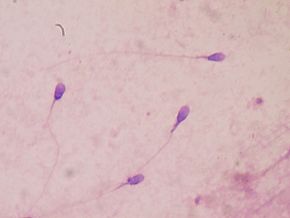 Reading the following study, I thought to myself - OK, once again someone is testing a supplement, but generally studies find that supplements don't do as well as real, actual foods in whatever is being tested. In this case, a supplement containing lycopene, which is found in tomatoes, was tested by researchers in the UK to see if it would help with sperm quality in men. Other studies have found dietary lycopene to have health benefits (e.g. lower incidence of lethal prostate cancer), which is among the reasons the researchers focused on testing it for semen quality.
Reading the following study, I thought to myself - OK, once again someone is testing a supplement, but generally studies find that supplements don't do as well as real, actual foods in whatever is being tested. In this case, a supplement containing lycopene, which is found in tomatoes, was tested by researchers in the UK to see if it would help with sperm quality in men. Other studies have found dietary lycopene to have health benefits (e.g. lower incidence of lethal prostate cancer), which is among the reasons the researchers focused on testing it for semen quality.
The study design was nice - with 60 young healthy men randomly assigned to one of 2 groups - the supplement group and the placebo group, and no one knew who was assigned to which group (double blind). They took either the lycopene supplement (14 mg/d of lactolycopene, equivalent to 2 kg of cooked tomatoes) or a placebo for 12 weeks. They found changes in sperm quality after the 12 weeks, with significant improvement in the proportion of "fast progressive sperm" and normally shaped sperm (morphology). However, "motile sperm concentration" (the number of moving sperm) did not improve - and this is considered the main measure associated with chance of conception. So it is unknown how the 2 things that improved would affect fertility.
Bottom line: Studies find numerous health benefits from diets rich in fruits and vegetables, including tomatoes and other red foods, such as watermelon, papaya, and pink grapefruit. And yes - ketchup is a good source. Apparently more lycopene is bioavailable when tomatoes are cooked or processed, especially when cooked in oil (as compared to raw tomatoes). And when eating fruits and vegetables, try to eat as many that are organically grown, because eating fruits and vegetables with high levels of pesticide residues has a negative effect on sperm quality.
From Science Daily: Dietary supplement from tomatoes discovered to boost sperm quality
Sperm quality can be improved with a simple diet supplement containing a compound found in cooked tomatoes, according to new research by the University of Sheffield.
The first ever double-blind randomised controlled trial to assess the impact of giving men a dietary compound called LactoLycopene, was led by Allan Pacey, Professor of Andrology Reproduction and Head of the University of Sheffield's Department of Oncology and Metabolism, and Dr Liz Williams, a leading specialist in Human Nutrition at the University of Sheffield. The team discovered it is possible to increase the proportion of healthy shaped sperm (sperm morphology) and boost 'fast swimming' sperm by around 40 per cent.
Lycopene can be found in some fruits and vegetables, but the main source in the diet is from tomatoes. Lycopene is a pigment that gives tomatoes their red colour, but dietary Lycopene is poorly absorbed by the human body, so the compound used for the trial was a commercially available formulation called LactoLycopene; designed by FutureYou Cambridge to improve bioavailability.
The 12-week trial designed by Dr Williams involved 60 healthy volunteers aged 19 to 30. Half took LactoLycopene supplements and the other half took identical placebo (dummy pills) every day for 12 weeks. Neither the researchers nor the volunteers knew who was receiving the LactoLycopene treatment and who was receiving the placebo. Sperm and blood samples were collected at the beginning and end of the trial.
"The improvement in morphology -- the size and shape of the sperm, was dramatic. We used a computer system to make these measurements, which takes a lot of the human error out of the results. Also, the person using the computer didn't know who had taken LactoLycopene and who had taken the dummy pills either.
